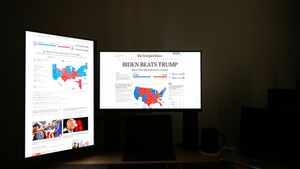Following the overthrow of President Bashar Al-Assad, Syria is now entering a pivotal transition phase under the leadership of interim President Ahmad al-Sharaa. Appointed less than two months ago, Al-Sharaa has declared his intentions to reshape Syrian politics and society after years of turmoil, civil war, and economic instability.
Al-Sharaa's inaugural speech focused on the establishment of a government inclusive of all Syrian communities. He promised to form what he described as a ‘constitutional declaration’ which would act as the legal backbone for this transition and call for the National Dialogue Conference to involve various aspects of Syrian society.
“Syria’s first priority is to fill the governmental vacuum in a legitimate and legal way,” stated Al-Sharaa, who has served as leader of the Islamist group Hayat Tahrir al-Sham (HTS). His vision involves the formation of new governing bodies, including the creation of small legislative councils to replace the disbanded People’s Assembly.
One of the most radical reform measures proposed is the dissolution of the existing army and security services, including all armed factions involved in the uprising against Assad. Al-Sharaa also called for the elimination of the Baath Party, which had maintained control over Syria for decades. The ultimate goal is to pave the way for a new constitution and instill lasting peace throughout the nation.
International support for this transition is significant. During the initial stages of this political restructuring, Qatar's Emir Sheikh Tamim bin Hamad Al-Thani visited Damascus, emphasizing the urgent need for inclusive governance. The emir acknowledged the importance of representation for all segments of Syrian society, which is integral to recovering from the devastation of the past years.
“We will work hard with the international community to support the desire of the Syrian people to achieve everything for which they have sacrificed,” the Emir stated on social media, highlighting optimism surrounding the transition.
Yet, the path to stability will face numerous hurdles. Existing factions within Syria, both domestically and among the diaspora, have voiced concerns about HTS's influence within the new government. Protests erupted in Germany against the possible inclusion of extremist groups, indicating significant divisions still exist among the Syrian people.
Internal analysts, such as Manhal Baresh, caution against rushing these institutional decisions, emphasizing the importance of legitimacy derived from public support rather than mere military might. “The interim president has neither the right nor the mandate to form a legislative council,” he noted, signaling skepticism about the government's ability to enact meaningful reform.
Nanar Hawach from the International Crisis Group highlighted the need for careful consideration of representation within the transitional assembly. “The devil lies in the details,” she remarked, pointing out the uncertainties surrounding who will be included and the methods of selection.
The external geopolitical climate affects the transitional government, with several foreign nations commencing to adjust their views on Syria. Recent discussions have revolved around lifting certain sanctions to facilitate economic recovery and support the new government. Al-Sharaa’s administration will need to balance these international relationships carefully to maintain credibility both within Syria and on the global stage.
Effective governance also hinges on addressing the dire humanitarian crisis facing millions of Syrians. Al-Sharaa noted the overwhelming number of people requiring assistance as the country attempts to rebuild after years of conflict. The UN reported humanitarian needs at the highest level since the onset of the civil war, with over 16 million Syrians requiring aid.
Despite economic plans being laid out by new officials, such as Finance Minister Mohammad Abazeed aiming to reduce corruption by reshaping the public sector, the future remains uncertain for economic stability. Al-Sharaa's leadership will be pivotal in either enabling growth or falling back to the chaos previously experienced under Assad’s regime.
Syria's transitional phase will undoubtedly require astute navigation of both domestic expectations and international relations. With tensions still evident among factions and the need for inclusivity apparent, Al-Sharaa's tenure will be marked by the necessity to balance diverse interests and cultivate trust among the Syrian populace.
While the interim president set forth ambitious plans for institutional reform and inclusivity, the effectiveness of his government will be determined only by how well it can represent and unify the varied voices of Syria. The challenges are vast, but so are the hopes for a peaceful and inclusive prospect for the Syrian people as they move forward from decades of oppression.



